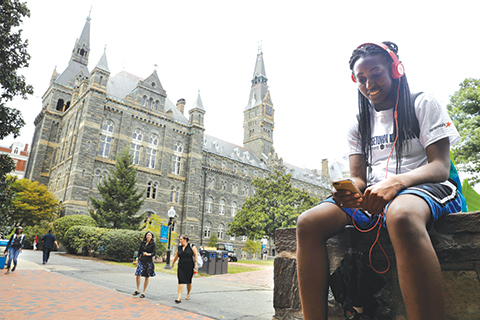 Deja Lindsey, 20, a junior at Georgetown University, talks on her cell phone in front of Healy Hall on campus, Thursday, Sept. 1, 2016, in Washington. After renaming the Mulledy and McSherry buildings at Georgetown University temporarily to Freedom Hall and Remembrance Hall, Georgetown University will give preference in admissions to the descendants of slaves owned by the Maryland Jesuits as part of its effort to atone for profiting from the sale of enslaved people. Georgetown president John DeGioia announced Thursday that the university will implement the admissions preferences. -AP
Deja Lindsey, 20, a junior at Georgetown University, talks on her cell phone in front of Healy Hall on campus, Thursday, Sept. 1, 2016, in Washington. After renaming the Mulledy and McSherry buildings at Georgetown University temporarily to Freedom Hall and Remembrance Hall, Georgetown University will give preference in admissions to the descendants of slaves owned by the Maryland Jesuits as part of its effort to atone for profiting from the sale of enslaved people. Georgetown president John DeGioia announced Thursday that the university will implement the admissions preferences. -AP ASHINGTON: Georgetown University on Thursday announced measures to atone for profiting from the sale of nearly 300 slaves in the 19th century, giving an edge in admissions to their descendants. University President John DeGioia promised an official apology that would come in the form of a "mass of reconciliation in which we will seek forgiveness for our participation in the institution of slavery."
Georgetown is also renaming school buildings to honor those enslaved, creating a new institute for the study of slavery and building a memorial honoring slaves whose work benefited the university. Georgetown, a Jesuit school founded in 1789, is one of the oldest universities in the United States. In 1838, the sale of 272 slaves who worked on Jesuit plantations in nearby Maryland helped finance the university's operations. The sale was worth about $3.3 million in today's dollars, and the slaves were sent off to Louisiana.
The school used about $500,000 in today's dollars of the proceeds to pay off the school's growing debt. Nearly two centuries after Georgetown's slave sale, America is still grappling with the legacy of slavery, which was formally abolished in 1865. The reconciliatory moves are the outcome of a year-long, 16-member working group at Georgetown including students, faculty, staff and alumni. It found that many of the slaves were later resold.
"This community participated in the institution of slavery. This original evil that shaped the early years of the republic was present here, and we have been able to hide from this truth, bury this truth, ignore and deny this truth," DeGioia said during a speech on the campus in the US capital Washington. "As a community and as individuals, we cannot do our best work if we refuse to take ownership of such a critical part of our history," added DeGioia, who met with descendants over the summer in several cities of Louisiana and in Spokane, Washington.
Descendants will be given "an advantage in the admissions process", the working group recommended. But the university stopped short of suggesting they be given financial aid. "While we acknowledge that the moral debt of slaveholding and the sale of the enslaved people can never be repaid, we are convinced that reparative justice requires a meaningful financial commitment from the university," its report said.
Several descendants of slaves who toiled at and for Georgetown also spoke. "Our goal is to unshackle the hearts and the minds of those who were never physically in bondage but nevertheless work under the vestiges of our nation's slavery," one read from a joint declaration, calling for more involvement in the reconciliatory process.
'Decades for Significant Impact'
Other top American universities - including Brown, Columbia and Harvard - have also publicly recognized their own ties to the slave trade. While hailing Georgetown's admissions moves as "new" compared to those of its competitors, historian Craig Wilder, who has studied universities and slavery, warned "it will take decades for it to have any significant impact." "Its real value will be determined by how these commitments get institutionalized on campus," he told AFP. David Collins, a Jesuit priest and director of doctoral studies at Georgetown, urged the school's community to "make the report what is meant to be: not a conclusion but a beginning."
'Part of our History'
Georgetown's slaves were not only forced to work at the Jesuit plantations in Maryland. They also worked on the campus itself, some brought there by wealthy students in the then port city of Georgetown, which was active in the slave trade. The working group estimated that about 10 percent of the campus population in the early 19th century was enslaved. And all the earliest buildings on campus, including those being renamed, were likely built by slave labor.
The two buildings being renamed originally paid tribute to Thomas Mulledy and William McSherry, two former presidents of Georgetown who organized the 1838 slave sale. One will now be known as Isaac Hall, after the 65-year-old man who was the first person named on a document listing the slaves sold. The second building will now be called Anne Marie Becraft Hall, honoring a woman who opened a school for black girls in the Georgetown neighborhood in the 1820s. "Slavery - slave labor and the slave trade - is part of our history," the working group said in its 102-page report. "We are, after all, slavery's beneficiaries still today. There can be neither justice nor reconciliation until we grasp that truth." - AFP










